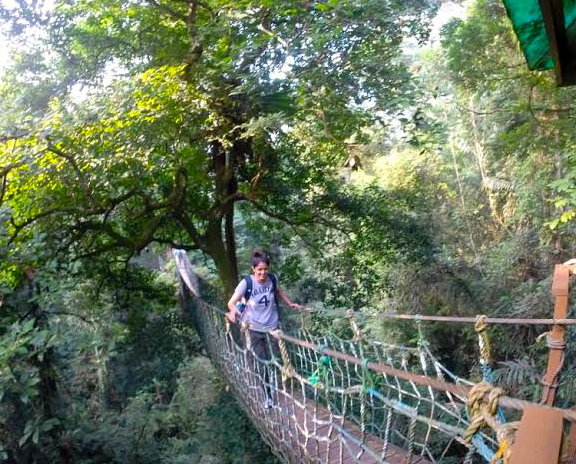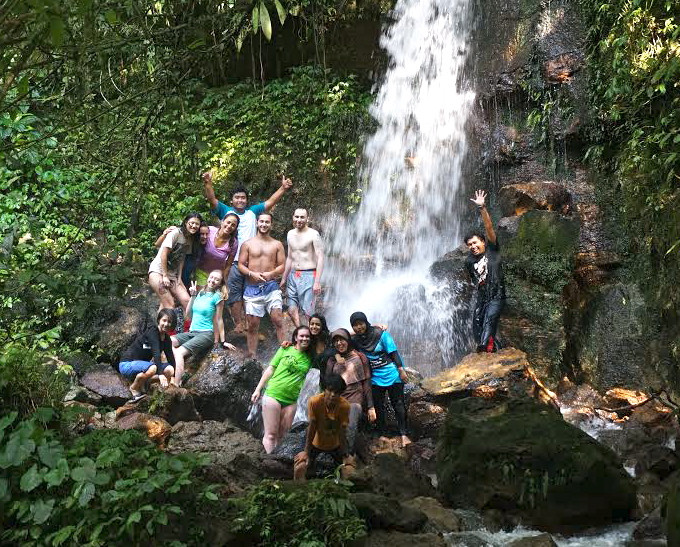EENR Undergrads Learn the Primatology Ropes in Borneo

Last June, EENR undergraduates Amanda Bevan and Aishwarya (Ash) Bhattacharjee traveled to Borneo as part of a Rutgers study-abroad program in Primatology, Ecology, and Conservation, led by Professors Erin Vogel and Rob Scott. They found the experience to be both challenging and rewarding: it pushed them beyond their personal comfort zones and tested their physical endurance, but the academic and cultural rewards were life-changing.
In the first part of the program, Amanda and Ash explored Halimun National Park and learned how the local West Javan community sustains itself with ecotourism and tea trade. In addition, they ventured into the rainforest with local tour guides or world experts on West Javan flora and fauna. “We were really fortunate to have [them] out with us for a large part of the trip,” says Amanda. “The tour guide could see the most camouflaged things,” including the primates such as the endangered Javan gibbon and macaques. She adds, “We couldn’t communicate through language, but we connected over a shared awe and respect for the forest.”
 Next, at the Tuanan Biological Research Station, Amanda and Ash took part in intensive field studies of primate ecology, including focal observations of orangutans. “We were both part of groups that did daily activity budgets for the orangutans,” said Ash. At one point, adds Amanda, “we followed an orangutan who had a six-month old baby. It was so cute!” So how did they know how to follow the orangutans? In addition to acoustic surveys and nest identification, “we learned about the type of vegetation they ate,” says Ash. “We examined fruits [to figure out] what the orangutans were eating, and whether they were nearby.” Amanda elaborates on a key part of the primate census taker’s skill set: “We got really good at smelling pee,” she laughs. “When you’re in the swamp, the orangutan smell is unmistakable.” The students learned that the orangutans in the post-logging forest appear to be living in a negative energy balance. This in part stimulated Ash’s interest in focusing her career on how human degradation of ecosystems affects the biology of the other organisms.
Next, at the Tuanan Biological Research Station, Amanda and Ash took part in intensive field studies of primate ecology, including focal observations of orangutans. “We were both part of groups that did daily activity budgets for the orangutans,” said Ash. At one point, adds Amanda, “we followed an orangutan who had a six-month old baby. It was so cute!” So how did they know how to follow the orangutans? In addition to acoustic surveys and nest identification, “we learned about the type of vegetation they ate,” says Ash. “We examined fruits [to figure out] what the orangutans were eating, and whether they were nearby.” Amanda elaborates on a key part of the primate census taker’s skill set: “We got really good at smelling pee,” she laughs. “When you’re in the swamp, the orangutan smell is unmistakable.” The students learned that the orangutans in the post-logging forest appear to be living in a negative energy balance. This in part stimulated Ash’s interest in focusing her career on how human degradation of ecosystems affects the biology of the other organisms.
In Tuanan, they also interacted with families who currently subsist by illegal logging. They heard the explosions of dynamite used to fell trees at night, and learned that selling a few trees a week is what feeds their kids. Finding sustainable solutions for both the people and the wildlife of the area is a present-day challenge.
While their study abroad was hugely rewarding academically, it also included frequent tests of endurance, such as long hikes through the jungle and rustic living conditions. In particular, the Tuanan portion of the trip took the students further out of their comfort zones than they’d expected. “The heat, humidity, massive insects, and dumping a bucket of water on your head for a shower were very rustic,” said Ash. Amanda added, “It’s one thing to see big insects, but to actually have them on you is another. A cockroach the size of a twinkie crawled across my face!” And the brief times they spent in the city presented their own challenges, most notably the sense of inequality between men and women, said Amanda. But both agree that the experience made them stronger. “I definitely came out of this tougher,” says Amanda. “I wanted to push my limits and see how far I could go. I thought, if I can do this, I can do anything in America.”
Molly MacLeod, October 2014


